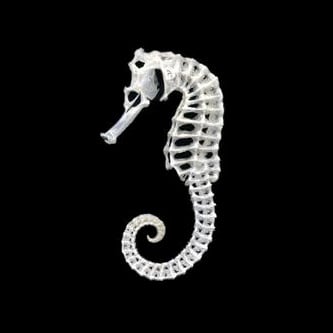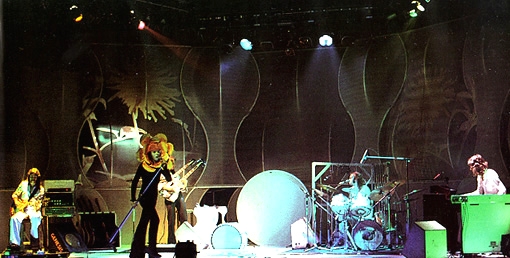/PAlogo_v2.gif) |
|
Post Reply 
|
Page <1234> |
| Author | |||
VanVanVan 
Prog Reviewer 

Joined: October 08 2009 Status: Offline Points: 756 |
 Posted: November 04 2010 at 22:32 Posted: November 04 2010 at 22:32 |
||
I have to disagree. Obviously there is influence on 90s bands by 70s bands, but not nearly so much as there was on 80s bands. Marillion sounds like Genesis, but Anglagard just sounds like Anglagard. In my eyes, (and I'm certain you'll disagree with me) the 90s and 00s were far more innovative than were the 80s. Toby Driver, the entirety of prog metal... the 90s and 00s contributed far more to the genre than did the 80s. Merely my opinion, of course, and you are more than free to disagree.
|
|||
|
"The meaning of life is to give life meaning."-Arjen Lucassen
|
|||
 |
|||
Ivan_Melgar_M 
Special Collaborator 
Honorary Collaborator Joined: April 27 2004 Location: Peru Status: Offline Points: 19535 |
 Posted: November 04 2010 at 22:08 Posted: November 04 2010 at 22:08 |
||
I'm not talking about Symphony orchestras or Symphonies (there's not a genre called Symphonic that has been around for hundreds of years)........I'm talking about Symphonic PROG which almost vanished in the 80's and that's a fact, very few Symphonic Prog bands released albums in this genre during that decade. Iván
|
|||

|
|||
 |
|||
ExittheLemming 
Forum Senior Member 

Joined: October 19 2007 Location: Penal Colony Status: Offline Points: 11415 |
 Posted: November 04 2010 at 22:01 Posted: November 04 2010 at 22:01 |
||
|
It seems absurd to cite the advent of digital technology in the 80's as the last credible innovation in music.
We're talking about SAMPLING here hello? i.e. the means to copy any audio source and splice same into your own music. Digital sampling should have represented a fantastic creative tool for musicians but it ended up as a lazy substitute for a lack of original ideas and that pretty much sums up the output of the 'magpie decade' in my book. Even something as dodgy as plagiarism has a hierarchy: to copy something verbatim and pass of as your own creation you can use a digital sampler - the other type of sampler is the one that exists between your ears and you actually have to understand music to replicate what you hear using one of those. |
|||
 |
|||
WalterDigsTunes 
Forum Senior Member 
Joined: September 11 2007 Location: SanDiegoTijuana Status: Offline Points: 4373 |
 Posted: November 04 2010 at 21:41 Posted: November 04 2010 at 21:41 |
||
They merely venture into the form, but where's the substance? Its rehashing the formula, sound, aesthetics and values of yesteryear. The 80s neoprog bands tinkered with the tones of their era, the last era of innovative sound design. The 90s bands, in contrast, copy the attitude and sound of the 70s. Progress? More like absolute regression. |
|||
 |
|||
moshkito 
Forum Senior Member 
Joined: January 04 2007 Location: Grok City Status: Offline Points: 16428 |
 Posted: November 04 2010 at 21:31 Posted: November 04 2010 at 21:31 |
||
Ivan ... you're going around the incorrect loop ... symphonic anything, of which we want to add the music we love, has been around for hundreds of years ... and it didn't disappear simply because Genesis went Pop and ELP went Kaboom and Disco went laladin!
There was progressive and symphonic music in the 80's ... that we are not acknowledging ... music never stops ... only our perceptions do! Not to mention the many different countries that also had music! We list them ... no one hears them ... one person throws a label at them ... and no one else checks!
Arts don't stop the world over simply because you or someone else or I do not think it is right or didn't happen yesterday at 5PM ... please accept that reality.
Symphonic anything in various forms is one of the most endearing and long lasting styles of music ... and we have been in love with the melodic and harmonic content in it for at least 500 to 600 years ... that it begs the saying ... the more things change, Ivan ... the less they change ... in the end, you still get into your pj's to go to bed!
|
|||
|
Music is not just for listening ... it is for LIVING ... you got to feel it to know what's it about! Not being told!
www.pedrosena.com |
|||
 |
|||
Poncho Lopez 
Forum Newbie 
Joined: March 08 2007 Location: United States Status: Offline Points: 8 |
 Posted: November 04 2010 at 21:29 Posted: November 04 2010 at 21:29 |
||
|
Prog rock today has more forms and shapes than before. so many genres, but we all conclude that symphonic rock are the real roots of prog rock. In the 80's symphonic prog was dead. and that's a truth. only neo prog. and yes. they help keep the light on for prog. but the true shape was vanishing. and then in the begining's of the 90's, mainly from sweden, bands like Anglagard, Par Lindh, Anekdoten, etc, were not afraid to continue the real reason why prog is know. and that's REAL PURE SYMPHONIC PROG ROCK. And... mmmm Anglagard (not well known in the prog community)? are you for real?
Only 2 albums. that's not much. but they archive great respect from the real long veteran prog fans....Yes, with only 2 albums
Be happy
|
|||
|
la mejor musica del universo es esta! no pierdan el tiempo con otra musica
|
|||
 |
|||
moshkito 
Forum Senior Member 
Joined: January 04 2007 Location: Grok City Status: Offline Points: 16428 |
 Posted: November 04 2010 at 21:24 Posted: November 04 2010 at 21:24 |
||
So true ... so true it hurts!
I love it when some of these bands, today, are considered "prog" and they have as much creativity as some of the stuff that goes down that toilet when you flush it. And keyboards? ... oh my god ... I'm not sure that we even want to use the word in relation to keyboards, lest we insult some of the originators of a lot of music and "sounds" ... which the majority of these bands today can't do and are afraid to do.
There are some good things today, but even Porcupine Tree haas a bit of the conventional in them, although Steven is trying hard to break the song structures ... the only thing they are missing is that Richard's keyboards are better on his solo albums than they are in PT ... and that limitation maybe on account of Steven himself! I can't really think of any other bands where the keyboards are used for sounds, not strings yet again! Or just another solo instrument with a different sound! Sorry DT ... you fail!
|
|||
|
Music is not just for listening ... it is for LIVING ... you got to feel it to know what's it about! Not being told!
www.pedrosena.com |
|||
 |
|||
richardh 
Prog Reviewer 

Joined: February 18 2004 Location: United Kingdom Status: Online Points: 26343 |
 Posted: November 04 2010 at 16:55 Posted: November 04 2010 at 16:55 |
||
|
Of course its a matter of perspective and taste. The idea that you can objectively decide a cut off date for innovation is nonsense. There were many that thought innovation ended at the end of the sixties and that music just became a souless enterprise after that dominated by 'Muso's' with little wit or creative ability.John Peel's put downs of Yes and ELP were very well known to prog fans.From his perspective Punk rode to the rescue and brought a more 'innocent' and less cynical approach back to music. Naturally I see it very different. The beauty of the nineties is that bands like Radiohead,Mansun and Oasis were able to draw upon a wider variety of influences. Noel Gallacher has expressed his love of Pink Floyd's The Wall. Radiohead were even called 'prog rockers' after OK Computer.Kid A then showed something different but like anyone they had to start somewhere. The Beatles started off covering American rock n roll songs before realising they could write their own songs. Music is a collective thing. Its dynamic and fascinating. Not some linear progression that starts at point A and ends at point B. |
|||
 |
|||
Ivan_Melgar_M 
Special Collaborator 
Honorary Collaborator Joined: April 27 2004 Location: Peru Status: Offline Points: 19535 |
 Posted: November 04 2010 at 09:33 Posted: November 04 2010 at 09:33 |
||
Sorry, but I don't buy this. I always believed that most bands of the 80's were extremely derivative, and the use of digital instruments might be an innovation or a revolution in technology, but I care more for the music than for the technology. Now, the bands of the 90's (mainly Swedish were not making derivatibve music, they were creating new and original Symphonic Prog.....It's clear that Symphonic Prog may sound closer to the 70's, but that's a logical consequence of he fact that most of the bands in the 70's played Symphonic Prog and the genre has a structure that's familiar fopr all of us.. You take bands as Marillion (which I love - art least Fish's era-) and you can say.."Hey Assassin sounds almost as "Battle for the Epping Forest", but in the case of Anglagard you can find that the sound is familiar, but not identify any moment with a song from a 70's band. This is because any Symphonic band will have some STYLISTIC similarity with Yes, Genesis or Camel, not because they are remaking Genesis, Yes or Camel's music. Symphonic genre was not created to last a decade and then vanish, Symphonic Prog reached the first peak in the 70's, but only in the 90's new bands dared to make new Symphonic. Iván
|
|||

|
|||
 |
|||
WalterDigsTunes 
Forum Senior Member 
Joined: September 11 2007 Location: SanDiegoTijuana Status: Offline Points: 4373 |
 Posted: November 04 2010 at 02:30 Posted: November 04 2010 at 02:30 |
||
Post-1989 music offers absolutely no innovation. The advent of digital brought music to its limits during the 80s; whether or not you enjoy synth-heavy bands is your problem, but they were the last real revolutionaries of the art form once known as music. Edited by WalterDigsTunes - November 04 2010 at 02:30 |
|||
 |
|||
richardh 
Prog Reviewer 

Joined: February 18 2004 Location: United Kingdom Status: Online Points: 26343 |
 Posted: November 04 2010 at 02:26 Posted: November 04 2010 at 02:26 |
||
But as I said before I believe there was a general wind of change in the 90's where real musicians and proper live music came back into vogue partly as a reaction against the plastic eighties and the overproduced nonsense that was shoved down out throats in that decade.Towards the end of the nineties you had fully fledged prog festivals and so many bands touring that it was hard to choose who to go and see. That trend continued well into the noughties although I think the world wide recession of the last few years has taken its toll and there doesn't seem to be as much about now as there used to be. Prog is very much a live performance thing imo.
|
|||
 |
|||
Ivan_Melgar_M 
Special Collaborator 
Honorary Collaborator Joined: April 27 2004 Location: Peru Status: Offline Points: 19535 |
 Posted: November 03 2010 at 19:46 Posted: November 03 2010 at 19:46 |
||
The first generation Prog fans talked ironically in the early mid 80's more commercial approach to Prog, the 90's is another story, Par Lindh formed the Swedish Art Rock Society as a reaction to what they saw as light Prog in the 80's and IMO it's a resurrection of the early values and sound of Progressive Rock.. In the 90's people already believed Prog was dead and the music of Anglagard is totally different to what Neo Prog bands did, it was Symphonic Prog of the best kind. I was there in the late 70's, early 80's and 90's, and by 1987 already believed Prog was dead, Anglagard gave me new hopes as well as PLP and Flower Kings. Iván. |
|||

|
|||
 |
|||
Andy Webb 
Special Collaborator 

Retired Admin Joined: June 04 2010 Location: Terria Status: Offline Points: 13298 |
 Posted: November 03 2010 at 16:38 Posted: November 03 2010 at 16:38 |
||
|
Although Anglagard is a great band, they're so tiny that I doubt they were responsible for the rebirth. I discovered them only a couple of weeks ago, and I'm pretty well versed in most somewhat "popular" prog bands.
I think the prog metal wave influenced it more, with Dream Theater, Spock's Beard, Symphony X, and bands like that, along with lighter bands like The Flower Kings, who gathered larger followings, unlike Anglagard who released like 2 or 3 albums and then we never heard from them again...
|
|||
 |
|||
moshkito 
Forum Senior Member 
Joined: January 04 2007 Location: Grok City Status: Offline Points: 16428 |
 Posted: November 03 2010 at 16:32 Posted: November 03 2010 at 16:32 |
||
I agree with this to an extent. And it is the same thing today, and actually it was the same thing way back then as well.
Too much of the stuff that is listed is just simple copy and has as much originality as ... and in the end, it is just another commercial adventure.
As for the prosecution, I'll leave that to your hands.
|
|||
|
Music is not just for listening ... it is for LIVING ... you got to feel it to know what's it about! Not being told!
www.pedrosena.com |
|||
 |
|||
Tony R 
Special Collaborator 

Honorary Collaborator / Retired Admin Joined: July 16 2004 Location: UK Status: Offline Points: 11979 |
 Posted: November 03 2010 at 07:11 Posted: November 03 2010 at 07:11 |
||
Exactly. The application of the word "Neo" was entirely and intentionally ironic. I am pretty sure that Marillion, IQ et al were mainly concerned with keeping the "prog tradition" ( I hesitate to say "movement" as there was no consensus amongst the 70s iconic bands) alive rather than creating something new. One could almost reasonably suggest that they were aiming for the markets that Genesis, Yes, and to some extent Rush, had deliberately left behind. In Marillion's case they embraced both the classic Genesis era and the more commercial post Hackett era and probably on the coattails of Genesis mega success in the early 80s were extremely successful commercially themselves in the UK. |
|||
 |
|||
Dick Heath 
Special Collaborator 
Jazz-Rock Specialist Joined: April 19 2004 Location: England Status: Offline Points: 12803 |
 Posted: November 03 2010 at 06:42 Posted: November 03 2010 at 06:42 |
||
|
I continue to disagree with you and stick to what we first generation progressive rock/music fans ironically meant by neo.prog when this music first appeared. Were you there?!
Edited by Dick Heath - November 03 2010 at 06:44 |
|||
|
The best eclectic music on the Web,8-11pm BST/GMT THURS.
CLICK ON: http://www.lborosu.org.uk/media/lcr/live.php Host by PA's Dick Heath. |
|||
 |
|||
Ivan_Melgar_M 
Special Collaborator 
Honorary Collaborator Joined: April 27 2004 Location: Peru Status: Offline Points: 19535 |
 Posted: November 02 2010 at 12:41 Posted: November 02 2010 at 12:41 |
||
Not only IMHO Dick, but also in the Prog Archives definition:
It's clear Dick, but not only here:
Even when poor and harsh, this definition goes directly to the main point.
Marillion is derivative from nobody IMPO, they were doing ORIGINAL CLASSICAL SYMPHONIC, not imitating any band, all their stuff is completely original and if they have influences from other bands (mainly King Crimson I believe), it's the same influence that bands like Genesis or Yes received from other coetaneous bands.
Making Symphonic Prog is not making 70's music, it's playing in one defined genre.
Cheers.
Iván
PS: The beach is waiting, I'll be back in Perú tomorrow or Thursday
|
|||

|
|||
 |
|||
richardh 
Prog Reviewer 

Joined: February 18 2004 Location: United Kingdom Status: Online Points: 26343 |
 Posted: November 02 2010 at 02:36 Posted: November 02 2010 at 02:36 |
||
I'm a big fan of Par Lindh who was also responsible from excellent and original prog rock from the 90's. Veni Vidi Vici sticks out.Of course he has his influences but he still created his own brand of prog that is unlike anyone else.
|
|||
 |
|||
moshkito 
Forum Senior Member 
Joined: January 04 2007 Location: Grok City Status: Offline Points: 16428 |
 Posted: November 01 2010 at 14:29 Posted: November 01 2010 at 14:29 |
||
I respectfully disagree.
Prog never died, and just continued on. And the 80's was a new breed, just like the 90's and then the new century.
We may look back and appreciate some of the older ones, but it is hardly fair to say that the new ones did not "have it" ... specially when we would probably trash KC's first album if it came out today instead of 1969 ... for being temperamental, selfish, over indulgent and pretentious! And of course, it is not metal, which means that it would'nt be considered "prog" ... and no one wants to hear cheasy lyrics and poems nowadays, unless you have some bigger noise.
Music has changed and the times changed. There was music in the 80's and 90's that was just as progressive as the ones we love to compare it to, but we're too damn stuck up to appreciate the differences and the new sounds and can only compare to some idiosyncratic master or hero.
It's too easy to say that Anglaagard and Anekdotten were influenced by KC ... and sadly, it takes away from their own inner voice and talent ... they are much better on their own, without any comparisons to anyone else.
|
|||
|
Music is not just for listening ... it is for LIVING ... you got to feel it to know what's it about! Not being told!
www.pedrosena.com |
|||
 |
|||
Dick Heath 
Special Collaborator 
Jazz-Rock Specialist Joined: April 19 2004 Location: England Status: Offline Points: 12803 |
 Posted: November 01 2010 at 12:13 Posted: November 01 2010 at 12:13 |
||
IYHO!!!! I was sold my first Anglagard album as a band have some echoes of Genesis sans the vocals. An opinion I've not disagreed with since. Hence neo prog in my language which is based on the original definition of neoprog, i.e. prog derivative in part, from what went before in the (early) 70's. So degrees of elaboration are irrelevant
|
|||
|
The best eclectic music on the Web,8-11pm BST/GMT THURS.
CLICK ON: http://www.lborosu.org.uk/media/lcr/live.php Host by PA's Dick Heath. |
|||
 |
|||
Post Reply 
|
Page <1234> |
| Forum Jump | Forum Permissions  You cannot post new topics in this forum You cannot reply to topics in this forum You cannot delete your posts in this forum You cannot edit your posts in this forum You cannot create polls in this forum You cannot vote in polls in this forum |